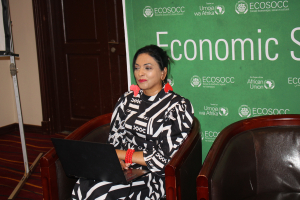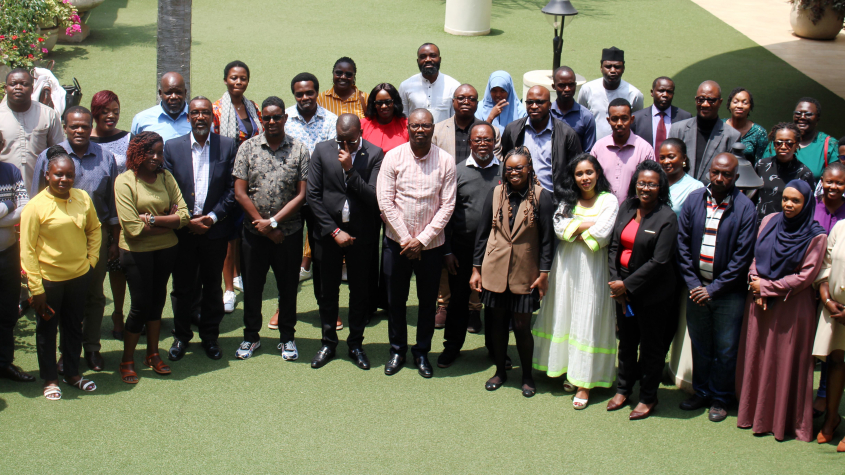BLOG | Movement under AU’s Free Movement Protocol not ‘ENTIRELY FREE’ [I]
In the first of a 3-part reflective series on the 2023 Free Movement Protocol (FMP) National Dialogue Series (NDS), Yavi Madurai reflects on her experience as the facilitator of the dialogue series, misunderstandings of the Protocol by AU Member States, as well as her hopes for Africa’s future lying in the continent’s young people.

“Where are the women?”
This rather ironic question was raised by South Africa’s President Cyril Ramaphosa at the largest gathering of Heads of State in the world – the UN General Assembly (UNGA). The 4-word sentence ripped to shreds the pages of history written by the greatest women activists that have shed their blood for the rights of women like myself to write and speak our minds.
To think that in 2023, an African President would ask such a question of a gathering of seemingly the most progressive Heads of State in history, feels preposterous. Nonetheless, here we are!
This got me thinking about the 2023 Free Movement Protocol (FMP) National Dialogue Series (NDS) with civic organisations, policymakers and the media, that was concluded in Nairobi, Kenya, a few days before UNGA. The NDS is an initiative of the African Union ECOSOCC, in collaboration with the Deutsche Gesellschaft für Internationale Zusammenarbeit (GIZ) GmbH, which implements its activities on behalf of the German government.
The fact that not a single Kenyan minister or senior official showed up left me with the same feelings of preposterousness. As a facilitator of the 2023 FMP-NDS in Lusaka, Mauritius and now Nairobi, I was many times tempted to ask the CSOs gatherings: “Where are the signatures?”
I didn’t want to ask this flippantly – rather as genuinely and authentically as I possibly could. My last blogs were on the BRICS Summit and how the African Continental Free Trade Area (AfCFTA) was on the minds and lips of just about everyone at the Summit. It is safe to say that most of us have been consumed by the AfCFTA euphoria, and we have even managed to convince the international community that the AfCFTA is Africa’s pathway to prosperity.
Here’s the problem: How are we going to deliver on the AfCFTA without the ratification of the FMP? How do Heads of State in Africa think we are going to get away with selling the AfCFTA story when it is only half a loaf? The FMP is the other half. Let me repeat a scenario I painted for the delegates of the Nairobi FMP dialogue.
It was about a simple case of a Kenyan truck driver having to drive over the border into war-scarred Somalia to deliver lifesaving medical supplies to victims of the terrorist insurgency in the unfortunate country. Under the AfCFTA rules, the driver’s goods will enjoy ‘free movement’ but because FMP has not come into force, i.e has not been ratified by the 15 required number of countries, the driver himself will not be allowed to cross the border.
However, if the driver were to take his goods to either Rwanda or Uganda [both members of the East African Community (EAC)] all that is required of the Kenyan truck driver would be a national ID document. He wouldn’t even need a travel passport. The irony is that access to lifesaving medicine and equipment is much more needed in conflict-ridden Somalia than in Rwanda or Uganda.
This scenario is entirely fictional yet it has its roots in reality. It simply illustrates my point about ‘free movement of people’ being as crucial, if not more crucial, to the free movement of goods, capital and services. Without equal attention to free movement, the economic development being touted as coming through the AfCFTA will simply remain a mirage and never become a reality!
The Nairobi dialogue was special in two ways: one was an unusual high proportion of young people in the room. Second, for the first time, we ran an Editor’s Forum with journalists from across East Africa, alongside the CSO dialogue session. The dialogue was oversubscribed with more than 100 CSOs in attendance.
Although the workshop activities we did with the Kenyan CSOs were exercises I have done countless times before, it felt very different this time around. Sadly, although the Kenyan Directorate of Immigration Services had committed to attending, they failed to show up. It would have been better if they didn’t accept to honour the invitation altogether since it seems they did not want to be asked, “Where is the signature?” This is an important question we have NOT been asking national governments with regards to the FMP.
But, I suppose, if President Ramaphosa could dare ask the Heads of State at UNGA the obvious question, “Where are the women?” then surely, we can also be direct in our approach and begin to ask the African Heads of State, “Where are your signatures?” Because it stands to reason that if we really are serious about achieving Agenda 2063, we need to be asking direct and obvious questions and not actually trust that African Union Member States will do what is right without being pushed to do so.
African countries’ reluctance to ratify the FMP is borne out of the fear of the unknown and the erroneous perception that the Protocol will allow for unregulated movement of persons into their territories. In reality, the movement under the Protocol is not entirely free – it’s subject to clearly defined rules and regulations. So, nothing about FMP is entirely FREE!
I love telling the story of the “Swinging Sixties”, the 9 years between 1960-1969 when Europe consolidated their integration efforts and built the European Union.
In NINE years. Yes, just NINE years.
The EU’s economic prosperity was built on the basis of the Four Fundamental Freedoms! And not xenophobia, tribalism or hating one another. I have no doubt they faced their own peculiar challenges, yet they were able to overcome them and drive their collective agenda of progress in such a way that there is now prosperity for all citizens of the EU.
The irony was that while they were busy uniting Europeans at home, our former European colonisers were at the same time dividing us here in Africa. Over six decades after decolonisation began, we are still grappling with the consequences of the artificial barriers created by colonisation. This is not a story I love telling, but it is a story that elicits a lightbulb moment from people’s faces.
With an unusually high percentage of youth in the room this time, this lightbulb moment happened quicker and in a more complex way, as the youth tend to look at the world from a more futuristic perspective. In terms of the FMP’s implementation and the idea of free movement in Africa, this difference is not just massive, but it is the difference we need to create Africa’s future prosperity.
















